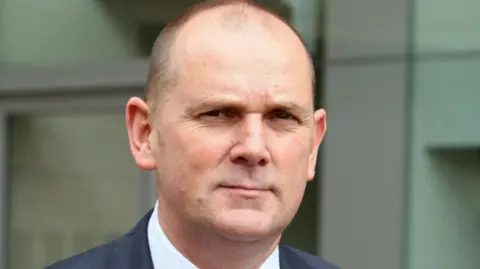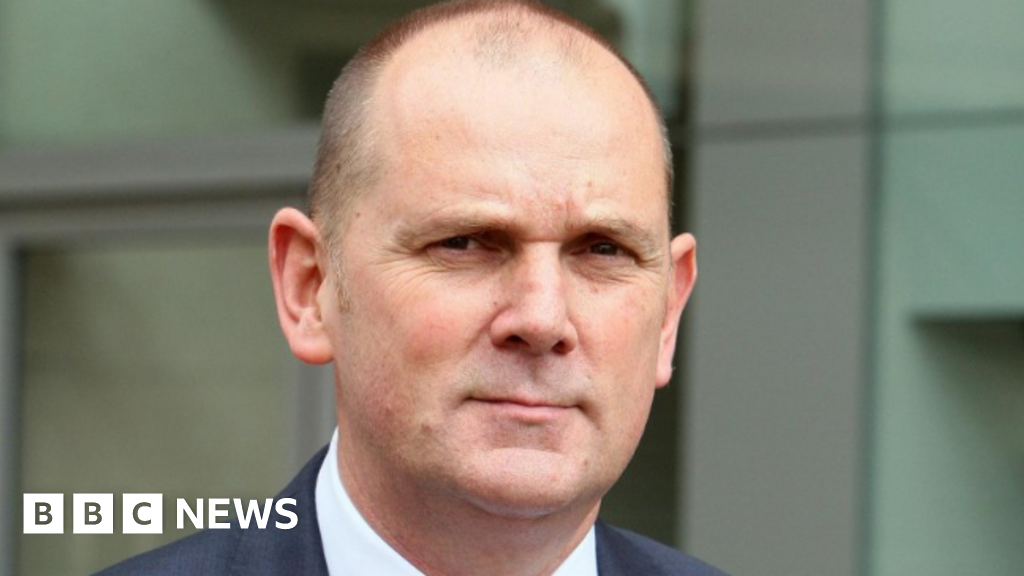Jennifer McKiernan,Political reporter and
Ruth Green & Nick Eardley,political correspondent
 PA Media
PA Media
Jim Gamble, a child abuse expert who headed up the Child Exploitation and Online Protection (CEOP) police command, has withdrawn from the grooming gang inquiry.
The former Northern Irish police officer was a candidate to chair the probe, but said “vested interests… political opportunism and point-scoring” had created a “highly charged and toxic environment”.
The move comes as Sir Keir Starmer was forced to defend the inquiry’s progress at Prime Minister’s Questions, after four survivors quit over concerns their voices were being silenced.
However, two more survivors, Samantha Walker-Roberts and Carly, have told the BBC they will stay on the panel and disagree with those who have resigned.
Jess, which is not her real name, earlier joined Fiona Goddard, Ellie Reynolds and Elizabeth, also not her real name, in standing down from the survivors’ panel.
All four had raised concerns that candidates to lead the inquiry had backgrounds in either policing or social work, due to the failures of those services to bring their abusers to justice.
Mr Gamble said the inquiry needed a chair trusted by victims and while the “majority” of those on the panel supported him, it was “clear that a lack of confidence due to my previous occupation exists among some”.
In a statement he said he had “hoped that my track record of fierce independence” would have “enabled me to proceed and hold the organisations and individuals who failed these young people to account whilst driving real change”.
Speaking to the BBC after stepping back from the inquiry, Mr Gamble criticised “adversarial approaches” taken on social media and in parliamentary debates.
He said the inquiry was “the opportunity of a generation to do the right thing” for survivors but was instead being used for “political point scoring”.
“I worry that victims and survivors who watch this are left with the feeling that this is never going to be resolved,” he added.
Mr Gamble, who was one of two candidates to have been identified publicly, met survivors on Tuesday, and follows Annie Hudson, who has a background in social work, in withdrawing.
He said he expected pressure from “victims and survivors” but was shocked by the level of “misinformation” in the political and online debate around the inquiry.
Mr Gamble said the decision on who to lead the inquiry should not be based on “the person’s previous occupation,” as grooming victims had been let down by multiple agencies.
He said: “The judges haven’t got it right, the court system hasn’t got it right, the police haven’t got it right, nor have social care, nor have health, nor necessarily have education.”
He also denied anyone had spoken to him about “diluting” or “expanding” the terms of reference to “be sensitive about how you address race”.
Watch: PM says grooming gangs inquiry will examine “ethnicity and religion of offenders”
A Home Office spokesperson blamed the intensity around the process for the pair pulling out and added: “This is an extremely sensitive topic, and we have to take the time to appoint the best person suitable for the role.”
Safeguarding Minister Jess Phillips has previously insisted there are people with legal backgrounds who are interested in chairing the inquiry.
At PMQs, Conservative leader Kemi Badenoch quoted the outgoing survivors’ concerns, telling Sir Keir they believe the inquiry would “downplay the racial and religious motivations behind their abuse” and asked “aren’t the victims right when they call it a cover-up?”
Sir Keir said “survivors have been ignored for many years” by the state and he wanted the inquiry to change that, adding “injustice will have no place to hide” and that Dame Louise Casey – whose report recommended a statutory inquiry – will now be working with it.
He invited those that have quit the inquiry to re-join, but added that whether they did or not “we owe it to them” to answer their concerns.
“The inquiry is not and will never be watered down. Its scope will not change. It will examine the ethnicity and religion of the offenders and we will find the right person to chair the inquiry,” he told MPs.
Badenoch went on to accuse the government of waging a “briefing war against survivors” and called for Safeguarding Minister Jess Phillips to be sacked.
She said: “Yesterday, the safeguarding minister said Elizabeth was wrong. Who should we believe? The prime minister’s safeguarding minister or Elizabeth?”
Sir Keir responded: “What we’re trying to do is get this right and have an inquiry with survivors at the heart.”
He said it was not an easy process, as “they’ve all come with difficult experiences, with a wide range of views, and every survivor does bring their own painful experience to this” but he added: “I want to press on and get this right.”
The national inquiry into grooming gangs was announced by Sir Keir in June, with powers to compel witnesses and a panel of survivors set up to oversee the process.
The terms of the inquiry are still being worked out and there are thought to be two panels and about 20 survivors involved in total.
Ms Goddard and Ms Reynolds quit the panels on Monday, followed by Elizabeth on Tuesday and now Jess, not her real name, who was raped between the ages of 12-17 in Kirklees, West Yorkshire.
Jess said she was “deeply shocked” when she learned two of the candidates for chair had links to the police or social services, asking “how can we expect truth and accountability when those overseeing the process are connected to the systems that enabled the cover-up?”
She detailed how police dismissed her as a “child prostitute” when she first approached them, how she waited 20 years for justice, and how she was unhappy that officials were “steering the process” toward wider issues of child sexual abuse and exploitation.
“While all forms of child abuse are abhorrent and deserve their own dedicated inquiry, this particular inquiry was meant to focus on grooming gangs,” she said.
“That issue alone is vast, deeply-rooted, and has been covered up not just for years, but for decades. It deserves to stand alone and be addressed with the seriousness it warrants.”
Another survivor, Elizabeth, told BBC Radio 4’s Today programme: “We don’t want it widening. We want it to be on grooming gangs – we want our voice.”
The BBC has spoken to two more survivors who are sticking with the panels and have criticised those who have quit.
Samantha Walker-Roberts, from Oldham, wants the scope of the inquiry to include victims of other types of sexual abuse, so they are not “silenced”.
She was the victim of a grooming gang when she was 12 – but she was also raped and abused by a man who groomed her online, and as a younger child she was raped and abused by older men who she met through friends.
Ms Walker-Roberts told the BBC: “This is a one-of-a-kind type of inquiry where survivors are in control and it’s wrong that certain survivors get special treatment to be part of this.
“It’s wrong certain survivors can’t see past their own trauma because everyone deserves to be part of this and deserves justice… Survivors like us need to be part of this, so the scope needs to be widened otherwise we’re going be silenced.”
She added she had no problem with a chair who had a background in policing or social work, as this had been “proven” to work with previous review chairs, where “one was former cop, one was former social worker.”
Another supporter of the inquiry is Carly, from Huddersfield, who said she believes “the most effective way to drive meaningful change is from within” and remains “hopeful” the concerns raised by others “will lead to constructive improvements”.
“I’m calling on the government to remember that they are dealing with real people who have suffered horrendous abuse,” she said.
“Survivors should be at the centre of this inquiry, and political debates must be left at the door.”
Watch: Abuse survivor Ellie Reynolds says a judge should lead grooming gangs inquiry


